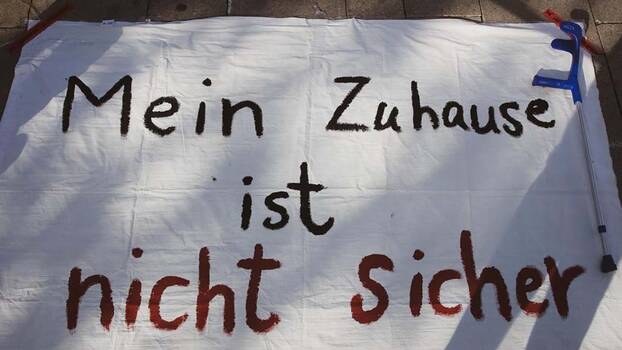
Refugee shelters in Germany took on prison-like characteristics in many places during the COVID-19 pandemic and developed into hotspots of dynamic infection events. For many residents, the pandemic significantly worsened their already stressful living conditions. The protest of the residents, however — despite repeated resistance to the lack of infection protection in various shelters — often received little public attention.
As part of the research project “Endangered Lives. Everyday Life and Protest in Refugee Shelters in the Wake of the Corona Pandemic”, Nikolai Huke conducted 16 interviews with residents in German, English, French, and Farsi. The interviews reveal an appalling picture of living conditions in refugee shelters in many respects. The problems described range from racism, inadequate medical care, noise pollution and lack of privacy, to traumatic experiences due to deportations and violence from security forces. In this interview, Edouard Abdou talks about his everyday life in an accommodation for refugees during the pandemic.
Where is the accommodation where you live?
It is an old barracks in the middle of the forest. There are no neighbours, you are all alone. There is no one around you. There used to be a bus that took people into town, where you can go shopping, all the way to the train station. But now the bus drivers have stopped because they do not want to carry foreigners anymore. So, you must walk from the station to the city. Everyone who wants to take the train or go shopping must walk. You can also rent bicycles; in which case you must pay a deposit. As soon as something is broken, they take something from the deposit.
What was your experience with the people in the city?
There are many racists there. Many do not want foreigners. Since the beginning of the COVID-19 pandemic, many people see you as a disease carrier when you shop in the supermarket.
Can you tell me about the room situation in the accommodation?
The situation is not good at all. There are small rooms where four people are accommodated. If you are lucky, you will be in one of those rooms. If you are unlucky, you are in a room with six, seven, or eight others. You have a bed and a small mattress. In the building there is a toilet for over a hundred people at a time. That is unacceptable, 100 people and one toilet, one shower. That is not good. Social distancing means one meter fifty distance. Four or five people in a room have no possibility of being one and a half meters apart. You also share the toilet with over a hundred people. So, you can’t follow hygiene rules in the COVID situation, it’s just not possible.
How was your relationship with the other people who lived in your room?
It was a rather hostile relationship. I was the only one who spoke French, the rest spoke English, but we were from the same country. There were moments when we had the political conflicts from the country of origin in the room. They often threatened me just because I spoke French. I had no confidence in them. Once I was even threatened, one of them said: “I’m going to cut your head off.” I then went to the social workers and asked them to take care of it. They said, “If this keeps happening, we will move you to another room.” Nothing more happened then. I waited for them to move me to another room one day, but they never spoke of it again.
How is the food supply in the accommodation organized?
There are mealtimes in the cafeteria, and you must queue to get something. With the COVID situation now, that is very dangerous. Everybody eats in the same cafeteria, 400 people at the same time, from 12:00 to 13:30.
Were there COVID cases in the accommodation?
Yes, there were. There were last week and there are now. If there are COVID cases, they just close the gate. No one is allowed to leave the area. You have no right to go outside anymore. Usually, you are allowed to spend a day or two outside, but not anymore. Anyone who returns must be quarantined. Those who were infected have been isolated. There is a building for this purpose, where one floor has been locked to house the people.
How has COVID changed your everyday life?
The situation was extremely difficult and very, very stressful. Everyone was afraid of everyone. You are together with 100 people. Everyone distrusts each other. The possibilities to have access to the social workers in the accommodation have become very rare, their office was temporarily closed.
At the beginning they bought disinfectant, but that did not last even a week. Since then, they have never bought any again. Before COVID I had an introductory language course, but with the pandemic everything stopped. That was only an introductory course anyway, access to real certified language courses is extremely complicated because you need a certain residence permit. All others have no access to courses or work.
How did you spend your time in the accommodation in the pandemic situation?
I slept, then I went to eat in the cafeteria. There was nothing else to do because all activities like sports were stopped. It was like being in a prison. You had no way to leave the accommodation, they controlled that. You did not even have the right to go for a walk. There was a lot of tension between the residents. It was a very stressful situation in the accommodation.